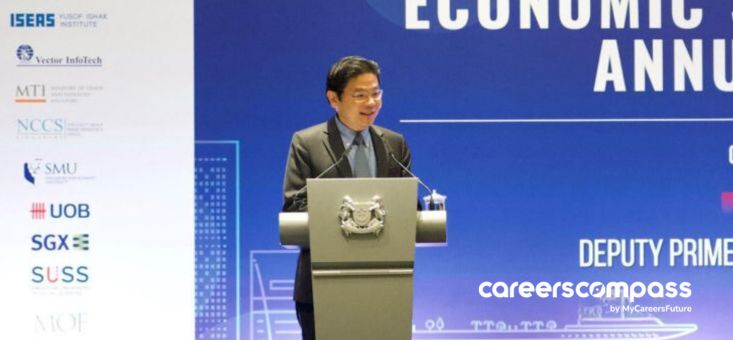During a recent speech at the Economic Society of Singapore Annual Dinner, Deputy Prime Minister (DPM) Lawrence Wong, also Minister for Finance, shared how the Singapore government will help our workers adjust to changing job market trends and disruptions.
One of the key highlights of his speech was an introduction to the expanded SkillsFuture system, which provides “appropriately sized” benefits, funded by the government, for retrenched workers to help them over the initial period of unemployment.
During the National Day 2023 Rally, Prime Minister Lee Hsien Loong shared that there were plans to support Singapore workers who lost their jobs as market trends shifted, often due to automation or artificial intelligence (AI).
“We can certainly expect more job disruptions. More of our workers will be affected by such disruptions and may lose their jobs several times throughout their careers,” said PM Lee.
“(But) the Government will give more support to workers, to help you adapt and upskill, to stay ahead of the game.”
DPM Wong admitted that there was caution about introducing unemployment benefits, given that some could find it more attractive to stay unemployed than return to the workforce. However, “looking at the faster pace of change and churn in our economy, we have revised and refreshed our thinking,” he shared.
He added in a panel discussion at a National Trades Union Congress event at the NTUC Centre that “a lot of effort” will be put into helping the retrenched and Singaporean workers, as they continue with upskilling and job search, to ultimately bounce back from these tough times.
Change is coming for Singapore workers, but SkillsFuture will help
DPM Wong also shared how the coming disruption from AI will be significant for Singaporean workers and even greater than the changes during the shift to computers in the 1990s.
In his speech, he shared a personal anecdote: “I remember in the early 90s, the changes in workplaces when personal computers became widely used.
“My mother was then a teacher, and she was very attached to her typewriter. All her work, exam scripts – everything was done on the typewriter.
“She found it very hard to adjust to using a computer. I could not quite understand it – typewriter, computer, seemed the same.
“But it was difficult for her. I tried to help her – maybe I was not such a good teacher – but she was never fully comfortable, and she eventually opted for early retirement at 55. That was the computer wave.”
He shared how the disruption from AI will be even greater, saying: “When I speak to chief executive officers of large firms, here and globally, they tell me their plans to use generative AI to drive greater efficiencies and transform their operations.
“This is not something that is going to happen in the distant future. It is already happening now, and the momentum will ramp up in the coming years.”
As such, many workers, including those in the professionals, managers, executives and technician (PMET) fields, could find their current job roles and responsibilities obsolete.
Looking for a new role? Explore over 100,000 jobs available on MyCareersFuture now!
Reskilling and upskilling are crucial for the Singapore workforce
He said there will still be other opportunities for Singaporean workers, but they have to be ready to refresh their skills for new career transitions.
A key goal for the Singapore government is to provide better prospects for Singapore’s broad middle/middle-income workers, to “advance their well-being by helping them secure jobs with good salaries and enable their real incomes to grow- not just nominal, but real incomes”, he added.
“Only then will they be able to tackle concerns over their cost of living and enjoy rising standards of living over time.”
Of course, some in their 40s and 50s could have caregiving obligations that could make it hard to find time to reskill and upskill, which is why the government will strengthen SkillsFuture to help, DPM Wong shared.
Introduced in 2015, SkillsFuture Singapore (SSG) aims to build a culture of skills development and lifelong learning. In 2022, about 560,000 individuals and 20,000 enterprises participated and benefitted from SSG-supported programmes.
DPM Wong revealed that government spending on continuing education and training has almost doubled since its launch in 2015 to nearly $1bn this year.
Some of the key initiatives being looked at include:
- Top-ups to SkillsFuture credit for mid-career workers.
- Training allowances for mid-career workers who take time off for longer or full-time courses.
- Support for career planning and coaching.
- Better job matching to aid Singapore workers to move into jobs that reflect their skills.
He elaborated on support for training allowances, saying: “(We understand) when you take time off, not just for one, two days, but for months, who is going to pay your salary?”
“So, training allowances will help them pay their bills while they take time off to study and to get a significant new injection of skills.”
DPM Wong admitted that it may not be easy to immediately see value in these investments into training Singapore workers, but believes these initiatives are essential to help locals adjust to the changes internationally and in job marketplaces, with workers themselves also taking active steps to upskill and reskill for the current and future job market.
“This is not something that we can just leave to the market – the Government has to step in and recognise that we are in a different environment. We want to provide better assurances and support for Singaporeans.”
He concluded: “But in the end, it is not just about Government policies, but about our collective actions – to nurture an ethos of solidarity and shared responsibility, where every Singaporean contributes and does our part to uplift our fellow citizens.
“That is how we can confront our challenges with confidence and keep the Singapore Story going for many more years to come!
(Image Credit: MOF)















